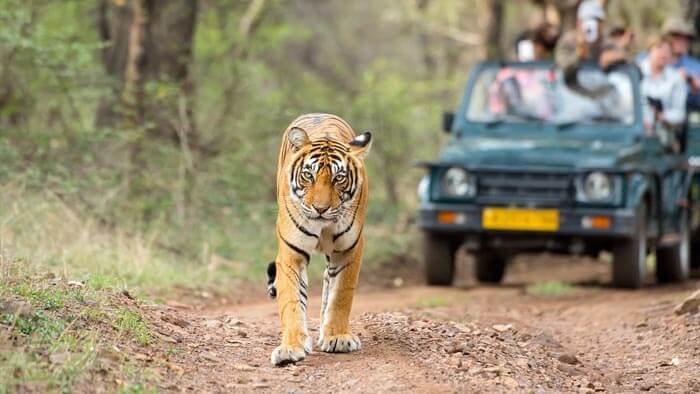A doctor finds parallels between life in the wilderness and inside a hospital as he negotiates the woodlands in the hope of sighting a tiger

We recently hosted an international neurosurgical conference in Mumbai, after which we decided to take some of our foreign faculty to see the tigers of Tadoba National Park. We had warned them that the two-day trip could possibly be renamed as the trees of Tadoba if we didn’t sight the big cats, but we were fortunate.
We hoped onto a late evening flight from Mumbai to Nagpur and drove through obscurity to reach our resort in the blackness of the night. After a two-hour power nap, we got into open top Gypsy cars and watched the sun rise over the expanse of the forest, the crispy chill of the early morning making way for the glowing warmth of dawn. The dense scent of slender bamboo trees flirting with their robust teak counterparts filled the air with an invigorating aura as we spotted deer with long antlers dart away into the bushes as we drove on our stipulated mud paths. The guide pointed out a few sloth bears, jungle cats, and wild boars amidst eagles perched on tall barren trees.
Suddenly, there were a flurry of calls from animals which are best identified in one’s imagination. “This is the call of a spotted dear,” our guide said, adding that it indicated a tiger in the vicinity. I heard another call in another direction from another creature and asked if we could drive there instead, but the sagacity of the seasoned guide revealed itself as he said that that was a mating call and only experience can distinguish the call of fear from the call of sex. “You have to be married long enough to know the difference!” he joked in Marathi.
All your senses are on high alert in the jungle. My gargantuan ears picked up another sound and I excitedly pointed out where it could be coming from, but the driver burst my bubble by stating that it was his cell phone vibrating. Just then, a flamboyant peacock fanning out its iridescent tail feathers ran across in search of his peahen. We didn’t get distracted and continued to drive in the direction of calls of the spotted dear, converging to a point around a pond where several jeeps were parked in wait of the tiger. And out from the grassland came Mowgli. Not the feral child from Rudyard Kipling’s Jungle Book but one of the most majestic young tigers of Tadoba. In a stride that somewhat resembled Sanjay Dutt with jowls that looked like his too, he walked towards us with gentility and grandeur. The number of cameras that shuttered in that one instant would douse any read carpet event in the world. He then made his way to the waterbody, lapped up a few litres, peered at eager tourists with his brooding eyes, and proceeded to walk across, unfazed as several jeeps backed up to make way for the beast as he wandered into the thickness of the woodland – much like the elusive surgeon who only sees the patient once during their entire hospital stay.
We explored other terrains, nosing other jeeps akin to seeking a ‘second opinion’ from another surgeon, but everyone was clueless about where to go next until we reached another waterbody in the distance and found a National Geographic videographer waiting at the spot. He was waiting for Maya to emerge. Maya, who is one of the most famed tigers in the entire reserve and hailed as the Queen of Tadoba. “I’ve been following her for seven years,” he said with a calmness that mitigated our restlessness. “I’ve also spent three days in the same spot waiting for her to emerge,” he added, revealing once again why it takes immense patience and persistence to succeed in anything. “That’s why this is called a game!” he joked. “It’s the equivalent of a long-term follow-up of a patient once you’ve removed the tumour, to know if it’s ever going to come back,” we surgeons remarked, trying to find a parallel with the animal universe as we returned to our hotel without sighting Maya.
Our relationships with our fellow beings reveal a lot about us, and John Berger explores this relationship in his essay Why We Look at Animals, waxing eloquently about how animals are the object of our ever-extending knowledge. Berger writes, “With their parallel lives, animals offer man a companionship which is different from any offered by human exchange. Different because it is a companionship offered to the loneliness of man as a species. Such an unspeaking companionship was felt to be so equal that often one finds the conviction that it was man who lacked the capacity to speak with animals — hence the stories and legends of exceptional beings, like Orpheus, who could talk with animals in their own language.” If I could speak with a tiger, I wonder what I would say. I wonder, first of all, if I would stay.
When we reached the gates the next day, we received information that two tiger cubs had been spotted under a tree, and the jeeps that heard the news started driving at manic speeds over muddy bumps, the dust from revving cars ahead of us filling up our lungs, as all of us attempted to reach the destination in time. I couldn’t help but liken the situation to a doctor being frantically called to the emergency to see a serious patient and all teams being ferociously mobilized before we lost the patient. And when we reached the ‘emergency’, we found the patient lying down and calmly chatting away with the patient next to him; the two cubs were exchanging playful notes. We sat for the next few hours watching them play, while their mother had gone to get them some grub. Just like a patient’s relative who is never available when you need them the most.
“Why are you so excited to search for and see a tiger every time?” I asked the guide after that zealous ride to get there in time. “You must have seen hundreds in your several years of being here and coming into the forest each day,” I wondered. “It’s the same reason how even after seeing thousands of patients over the years, seeing patients everyday makes you happy,” he justified. “Even though you do the same operation every time, you will find something different and exciting.” The parallel he offered made complete sense. We sat there for another hour, mesmerized by the spiritual quality tangible in the air as the two felines gazed back at us.




